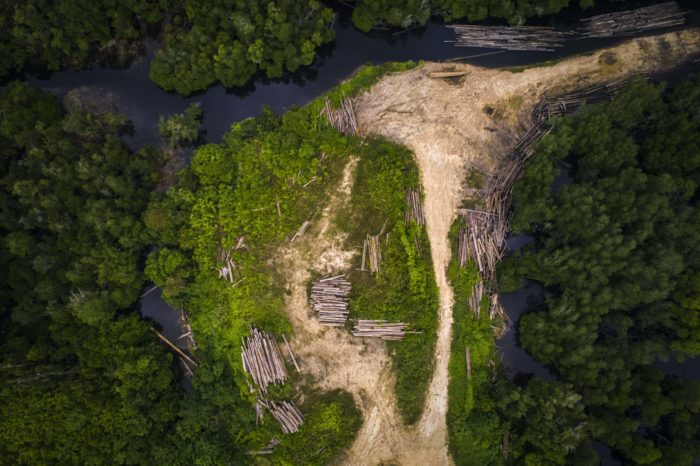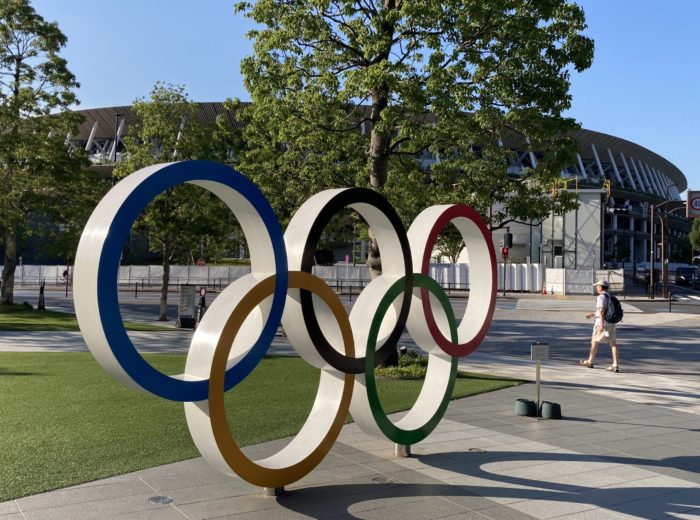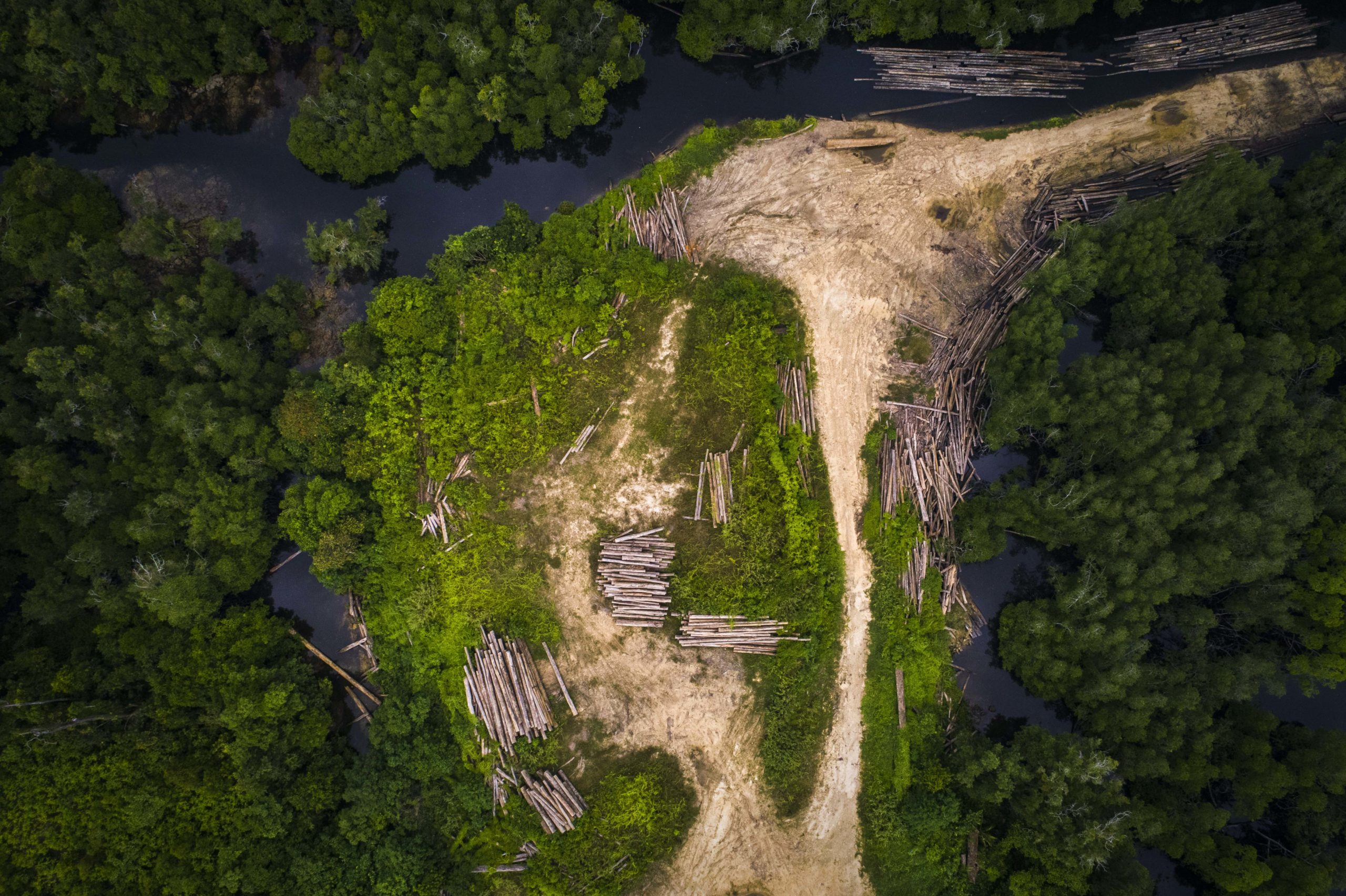In a non-COVID world, the Tokyo 2020 Olympics would now be in full swing, with athletes competing for the gold, cheered on by millions of people from around the world. Instead, the New National Stadium is empty, waiting for the new Olympic start date of July 23 2021.
The Tokyo Olympics are still hitting the headlines, but not with good news. A Tokyo 2020 Organizing Committee board member allegedly received $8.2m from the committee that spearheaded Tokyo’s bid for the 2020 Games, in order to lobby International Olympic Committee members — the scandal is now being investigated by French prosecutors.
But it’s another fresh corruption scandal that warrants our attention, as it involves Tokyo 2020’s supplier of construction timber from Indonesia.

On June 25, media outlet Al Jazeera reported that Tokyo 2020 timber supplier Korindo was “allegedly engaged in questionable deals” as they bought up rainforests in Indonesia to harvest timber and develop palm oil plantations. Korindo’s subsidiaries had cut down 40,000 hectares of rainforest across West Papua, home to Asia’s largest remaining rainforests, numerous Indigenous communities and unique biodiversity.
Financial statements from 2013-2015 showed a Korindo shell company in Singapore called Papua Agro Investments Pte Ltd (PAI) “made a payment of almost $22m to an ‘expert in getting plantation rights.’” Al Jazeera asked 10 anti-corruption experts to review the $22m payment, and all said it raised numerous red flags for bribery, given plantation permits have no official cost in Indonesia. Not only that, a 2018 investigation commissioned by the certification body Forest Stewardship Council (FSC) found that Korindo “violated the human rights of [West Papuan] tribes through highly flawed land acquisition and compensation processes.” The investigators found West Papuan tribes “lost $300m in deals with Korindo, and the company spent less than $5m on programmes to help them.” Korindo has denied these allegations.
How the corruption scandal relates to the Olympics
Rainforest Action Network (RAN) first uncovered extensive use of Korindo wood in May 2018, at the construction site of Tokyo 2020’s Ariake Arena volleyball stadium. We later confirmed use of Korindo wood at the New National Stadium as well, which built its concrete foundation using 117,800 large sheets of Indonesian plywood. Both venues used wood from rainforests converted to plantations like oil palm, and at least the Ariake Arena sourced wood from critically endangered Bornean Orangutan habitat. To date, the Tokyo 2020 organizers have failed to disclose how much Korindo wood they used, rejected six complaints we brought against them over their use of Korindo wood, and only partially disclosed where the wood was sourced from.
While there is no evidence that the timber came from Korindo’s operations in West Papua, there are clear connections between the scandal in Papua and the plywood mill that supplied the Olympic wood, which was operated by Balikpapan Forest Industries (BFI). Our research into Korindo’s opaque ownership structures found that Korindo’s Vice Chairman Robert Seung indirectly owned over 98% of BFI through a series of intricate circular shareholdings. Robert Seung is the son of Korindo’s Chairman, Eun-ho Seung, and the $22m consultancy fee was paid by Korindo’s shell company PAI, which lists Robert Seung as a director.
A permanently tarnished reputation
Korindo’s corporate governance issues aren’t limited to bribery. When Eun-ho Seung’s affairs were investigated by the South Korean tax authorities in 2013, the authorities discovered that “Seung had set up 62 shell companies in the British Virgin Islands, Hong Kong, Panama, the Seychelles, Singapore and elsewhere that collectively owned Korindo’s Indonesian assets through circular shareholdings.” As held by the South Korean court, all were acting under Seung’s control and for his benefit. In 2018, the court ordered Seung to pay around $90 million in back taxes, on grounds that the use of complex, multilayered ownership structures and nominee shareholders appeared to be for the purpose of evading taxes.

Tokyo Olympic organizers appear to have ignored the concerns about Korindo, instead focusing on securing cheap plywood for construction of its venues. And they’ve so far failed to take accountability for their lack of due diligence. Tokyo 2020’s Sustainable Sourcing Code actually stipulates that “Suppliers, etc. shall not be involved in corruption, such as bribery, throughout the production, distribution and other processes of procured products, etc”. Given Korindo has been a major timber supplier to the Tokyo 2020 Olympics, shouldn’t the Olympic body investigate whether this principle was breached, and if so, blacklist Korindo as a supplier for any future Olympics?
One year countdown — one year to fix this
As we mark the one year countdown, Tokyo 2020 organizers must come to terms with their flawed due diligence model and recognize that by doing business with harmful actors in order to save a buck, they are setting a bad precedent for Japan and the rest of the world.
Japanese companies with strong ties to Korindo should also think twice about their business relations with the company. This includes Oji, which has a pulp & paper joint venture with Korindo; SMBC, which financed Korindo until 2017; and Sumitomo Forestry, which supplied the Korindo wood to the Tokyo 2020 Olympics. More generally, Japanese companies must take into account the unfortunate prevalence of corruption risks in the Indonesian forest sector, and be willing to look beyond their immediate business dealings to assess their business partner or client’s entire Environmental, Social and Governance (ESG) performance across the company.
Tokyo 2020’s apparent failure to take these due diligence measures has come at a high cost of a permanently tarnished reputation. They must learn from their mistakes and adopt the necessary measures to avoid this from ever happening again.
